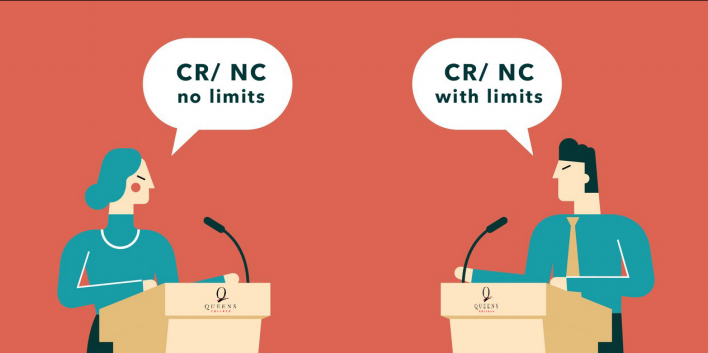Due to the continued waves of the COVID-19 pandemic, students have been pleading with college administrators to provide some sort of academic relief. In the case of the CUNY system, students have requested an extension of a Credit/No-Credit policy. The policy in question is essentially analogous to pass/fail, where students who suffered academically due to the circumstances of the pandemic can opt to swap a passing grade with “CR,” representative of credit. This comes at no cost to the student’s grade point average. The controversy of reinstating the aforementioned policy had faculty and students arguing at the latest Queens College (QC) academic senate meeting, held on Thursday Dec. 10.
Academic Senate Chair Simone L. Yearwood cleared up a misconception spread prior to the meeting that the academic senate would be voting on the Credit/No-Credit policy. Yearwood indicated that the senate was merely providing feedback & testimony for Queens College President, Frank H. Wu, to take under consideration.
The senate deliberated over three options. For the first option, the Credit/No-Credit policy would be applicable to all courses; the second option would allow the policy to be applied to certain classes if the College deemed it acceptable; the third option was a flat out rejection of the policy.
The QC Student Association (SA) introduced a resolution in support of the first option. With over 200 students present in the Zoom call, an outpour of support flooded the chat. Live testimony came from the student senators, citing the many issues students are facing amidst the pandemic.
Senator Alexander Kestenbaum, a junior majoring in Jewish studies, cited the recent passing of one of his relatives. Kestenbaum criticized QC for expecting students in his situation to be prepared for finals in the coming week (the one following the senate meeting), while dealing with immense grief. “My uncle passed away this morning… and now I’m expected to be mentally prepared for a final the following week on Monday” said Kestenbaum.
In light of these remarks, Senator Cayla Kempf, a junior majoring in psychology, emphasized the toll that the COVID-19 pandemic has taken on the mental health of students. Kempf also touched on the difficulty of students’ ability to access mental health resources to support themselves.
Whereas Kestenbaum and Kempf threw their support behind option one, faculty members remained skeptical about how liberal the policy is. An anonymous source in the QC Committee on Personnel and Budget confirmed that some department chairs fear that by allowing students to freely opt into the Credit/No-Credit policy, the long-term consequences would outweigh the short-term benefits. Simply put, faculty are concerned that if students opt to swap low grades for a notation of “CR” on the transcript, and those same students progress within the major, they will be ill-equipped after graduation for both the job market and graduate schools.
On a similar note, senator and professor in the School of Education, Theresa Gurl, noted that a policy like this would not be applicable to education majors. As Gurl explained at the senate floor, New York State sets GPA requirements for undergraduates, therefore negating the Credit/No-Credit policy’s use for students in the School of Education.
Nonetheless, many students made impassioned appeals to the administration in favor of enacting the policy for the fall semester. Student Association President, junior sociology major Zaire Couloute, argued that the pandemic has actually worsened since CUNY’s initial decision to enact the policy for the spring semester, and that the administration should act accordingly. Alexander Kestenbaum agreed and went further in saying that the adoption of the CR/NC policy for this semester would be the very least that QC could do for its embattled student body. Former SA President Joseph Cobourne, when given the opportunity to speak, made the case that the push to get the policy enacted did not come from a desire for grade inflation, but rather grade preservation. Others, like Cayla Kempf and Enrique Peña, gave their accounts of COVID-related struggles and noted that there were many others with similar situations who would not be able to speak that evening on their own behalf. Those in the chat gave their unanimous approval of the policy.
The meeting was not without its hiccups. President Wu established early on in the proceedings that the purpose of the conversation would not be to arrive at a decision then and there, but to gain insight into the perspectives of the student body at large, which he would then use to inform the decision that he would ultimately be making. This surprised some of the attendees, who believed that the decision would be made at the meeting. Senior delegate Andrea Buzon acknowledged that the confusion came down to a “miscommunication issue.”
The following day, President Wu sent out an email in which he acknowledged the “significant support for instituting a form of the Credit/No Credit option” and promised a prompt decision on the matter. As of the writing of this article, an official statement regarding the status of the policy has yet to be made.














